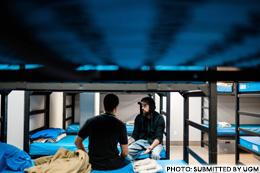Shelters struggle to support asylum seekers

By Hue Pham
New Canadian Media
Shelter providers across many of Canada’s major cities are saying that even with the federal announcement last month that $362.4 million will go into refugee funding this year, they’re worried the money won’t be enough, or might not make it to them at all.
Sam Watts, CEO of the Welcome Hall Mission of Montréal, said he’s not sure his shelter will see any of that federal funding.
“Québec will often want to do things slightly differently than the Feds envision. And so that can sometimes take some time before we see the first dollar. There’s been examples where it takes as long as three years,” said Watts.
Welcome Hall Mission of Montréal ordinarily services locals in need of emergency services. But Watts said the shelter had to dedicate an entire 30-bed dormitory for asylum seekers and refugee claimants due to the surge of demand.
“We pretty much had to,” he said.
In 2023, Québec had the most asylum seekers processed by the Canada Border Services Agency and Immigration, Refugees and Citizenship Canada at 65,570 applicants.
Watts said that many people coming to Canada will experience traumas from home countries and risk intergenerational trauma, services that aren’t supported by shelters.
“The housing requirements and the housing parameters for someone who has just arrived in the city is typically quite different compared to people who might have wandered in homelessness for a month or a couple of years,” said Watts.
Although Québec is expected to receive $100 million from the $362.4 million federal funding, Premier François Legault initially asked for $470 million to cover the debt of welcoming asylum seekers in 2021 and 2022.
The province of Ontario also has concerns about federal funding.
“The federal government needs to take responsibility for the crisis they created and provide the necessary funding to address it,” Ontario Immigration Minister David Piccini said in a joint statement with Ontario government house leader Paul Calandra.
Meanwhile, the City of Toronto recently unveiled its 2024 budget, with an expected 4,300 shelter beds for refugee claimants and asylum seekers to cost around $250 million.
In a town hall hosted on Jan. 25, Toronto Mayor Olivia Chow said that about half of the clients in the Toronto shelter system are refugee claimants.
Since the federal government sets the rules on how many refugees they will allow into the country, Chow said she’s expecting they provide the bulk of financial support for shelter services.
“I need to fight for Toronto,” said Chow.
Toronto will receive $143 million of the federal funding announced in January, along with $162 million from the federal Department of Finance for asylum claimants, but that money will also be shared with low-income renters.
Chow said the funding should cover expenses for Toronto, but only until March 2024. Chow previously suggested increasing property tax to over nine percent to cover the expense if federal funding didn’t come through.
Most newcomers in the shelter system are currently living in rented-out hotels by the city with no new long-term services to accommodate their needs.
Ontario was second in its rate of processing asylum seekers in 2023 with 63,390 applicants. In 2023, British Columbia processed 7,695 asylum seekers while Alberta had 6,050. Other provinces reported numbers in the hundreds or less.
Loren Balisky, Director of Engagement for the Vancouver refugee transitional shelter, Kinbrace, said many of the shelter’s clients are struggling with obtaining their refugee protection document, which will allow them to apply for welfare and earn a living.
Processing time for documentation can take years, said Balisky. Welfare would support the cost of living in Kinbrace.
“In terms of the rent costs, we charge the welfare rate,” said Balisky.
Organizations like Kinbrace don’t receive much federal funding, if at all, she said. The shelter relies predominantly on private donations, which is why they charge rent.
Even after they clear funding, claimants would still have to transition into permanent housing and enter a housing crisis with average rent costs for one-bedroom housing at around $2,500 in Vancouver, said Balisky.
In Calgary, President of End of the Rainbow Foundation Kelly Ernst said his organization created an outreach program to get newcomers sleeping in airports into hotels and permanent housing because the shelter system is often too full to accommodate them.
“It was not funded by the federal government at all. Some provincial funding is directed toward helping people in those scenarios. But most of it is actually through private funding,” said Ernst.
His organization serves LGBTQ+ clients who are either privately sponsored refugees or asylum seekers. He said Canada is missing a great opportunity due to the social stigma against refugees.
“A lot of asylum seekers are some of the most resilient people to just get to this country,” he said. “You see that people have really good experiences.”
Welcome Hall Mission’s Sam Watts said since migration trends are changing, the provincial shelter system has to be reimagined.
“Today, we’re dealing with a phenomenon in the world where there’s the greatest movement of people since the end of the Second World War,” he said.
UNHRC estimated the number of displaced individuals in 2022 was 108.4 million, with predictions that the figure will continue to grow. In 2021, that number was 89.32 million.









